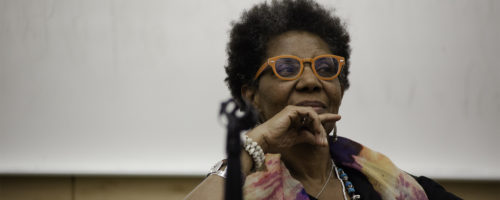M. NourbeSe Philip tells specific stories. Stories that are so particular to her, the life she’s lived what she has observed in the world around her. A Black woman, living in Toronto, Canada and still wearing a red, black and white bracelet as a nod to her home country Trinidad and Tobago.
Philip has been publishing her stories, and in turn stories of the Black diaspora, for decades through poetry, dub, essays and fiction. And she is completely in rhythm with the politics and issues of the present and the past.
Whether it’s Zong!, a historical poem about the slave ship of the same name, or a fiction piece Harriet’s Daughter about a Tobagonian girl searching for a loving family, the poignancy of her stories give way to an honesty that readers can recognize. It’s the honesty and specificity that makes them universally relatable.
In a passage in her newest work, a collection of essays Bla_K [Blank], she explains that the title can be read in two ways: Blank or Black, and both are correct. The pair of adjectives, she writes, “constitute the axis around which I exist as a writer in Canada.” Equal parts hyper visible, unique, expansive and a blank slate at once.
Philip spoke with Urbanology about her newest work, the role of the artist, the importance of observing the world closely and why writing is an act of resistance.
It says in your press materials, that your aim is to make us “see what has gone unseen” and I wonder, why is that your aim? Why have you made that your mission as a writer?
Well I’m not sure that I feel that my mission is to make anyone see what isn’t seen . . . I think the gift that artists have — all artists — is that they’re able to take an experience, take words, take movements, take gestures, and reformulate it in a way that when we see what the artist has done, or has accomplished, we see something — maybe we’ve seen it forever — but then we see it in another light. And suddenly things shift within you. I think that is the role of art.
So, for me, it’s less that I want to make people see what hasn’t been seen, but it’s really to work with what I see, and feel strongly and passionately about, and to speak a certain truth about it and then I remain very humbled and grateful if people see what it is I feel I am seeing in a situation.
I’m not trying to make people. I don’t want to make anybody do anything (laughs). I just want to speak a certain truth and speak to certain issues that I see around me that I feel affect the way I practise my art, and other people practise their art and practise their lives.
Why did you choose to write Blank now, in 2017, in this present political climate? Why is it that you chose these different stories from your past work and these new works to put together in one book right now?
The first collection of essays was a book called Frontiers so I have selected certain essays from that particular work. Essays that I felt still have a lot of relevance today . . . Sometimes in a slightly different way, but it seems to me the problems that I was looking at 25 years ago still remain with very little change. So that was what determined which essays I selected from the first work to put into Blank.
“It’s as if nobody wants to remain in the places that have been selected for them and selected for them by a very patriarchal, essentially white supremacist culture.”
Why now?
I suppose because we’re living in a time when, like 25 years ago, it can be thought of as exciting, it can be thought of as disturbing . . . All the groups that have been historically and traditionally marginalized or excluded, or if one wants to use the word oppressed in different ways, these groups are now, not now, once again, really coming forward with very strong voices. It’s as if nobody wants to remain in the places that have been selected for them and selected for them by a very patriarchal, essentially white supremacist culture, a very ableist culture as well, a very straight culture. Now, no one is willing to accept those places. That has been the case for a long, long time, but I think movements, these thrusts for something better, sometimes they come to a sort of crescendo, and maybe they sort of subside for a while, but I think it’s always there bubbling under the surface, sometimes coming to the surface, sometimes erupting … I think this is as good a moment as any.
With the Internet, nowadays it’s definitely a lot easier for people to write and share their work more freely. I wonder what advice you have for young people who want to write and refine their voice?
Pay attention, I would say . . . I think poetry demands a certain kind of attention, a certain kind of stillness, a certain kind of looking at and a certain kind of gazing. And so much in our lives today is all about noise. So, I think for those who want to be poets that is something that they’d have to cultivate. I’d also say find a good friend or mentor who will be able to read your work and give you an honest critique of it . . . Listen, when I was trying to get my manuscript She Tries Her Tongue published I think I had up to about 30-something rejections. And it takes a lot of guts, literally to believe in what it is you’ve done. Developing that stomach, or those guts, really comes from being able to trust yourself and that trust, having someone you trust say, look, this is not working, that’s working and so on. I think that goes a long way. And I think also being honest with oneself. Trying to be as honest with oneself as possible.
“I think from a historical/political [position] — it’s a form of resistance to tell your stories.”
Why is it important for Black women to tell their stories? A lot of your work pertains to Black people, to marginalized people, to sharing different voices. You share information about different events in history, but all of it I think kind of comes back to you being a Black woman, a woman from the Caribbean. So, I guess my overall question is why do you think it’s important for Black women to tell their own stories, and the stories of other Black women?
There has been and is still this major onslaught on African peoples and this sort of urge to erase, who they are, what they’ve done and how we are so central to so much . . . I think from a historical/political [position] — it’s a form of resistance to tell your stories. To say that I’m still here. And someone was here before me. And because of that someone I am here and I can speak to this. I think if nothing else, that is what is very important.
I think there are other reasons — I talked about the universality of the particular story — but I think for us, in this moment, right now, it’s saying I am here. I have a name and an address and I matter. And I matter to me, and I matter to us. And that I think is a powerful form of resistance.
Photos © Angelyn Francis + Urbanology Magazine




Comments are closed.